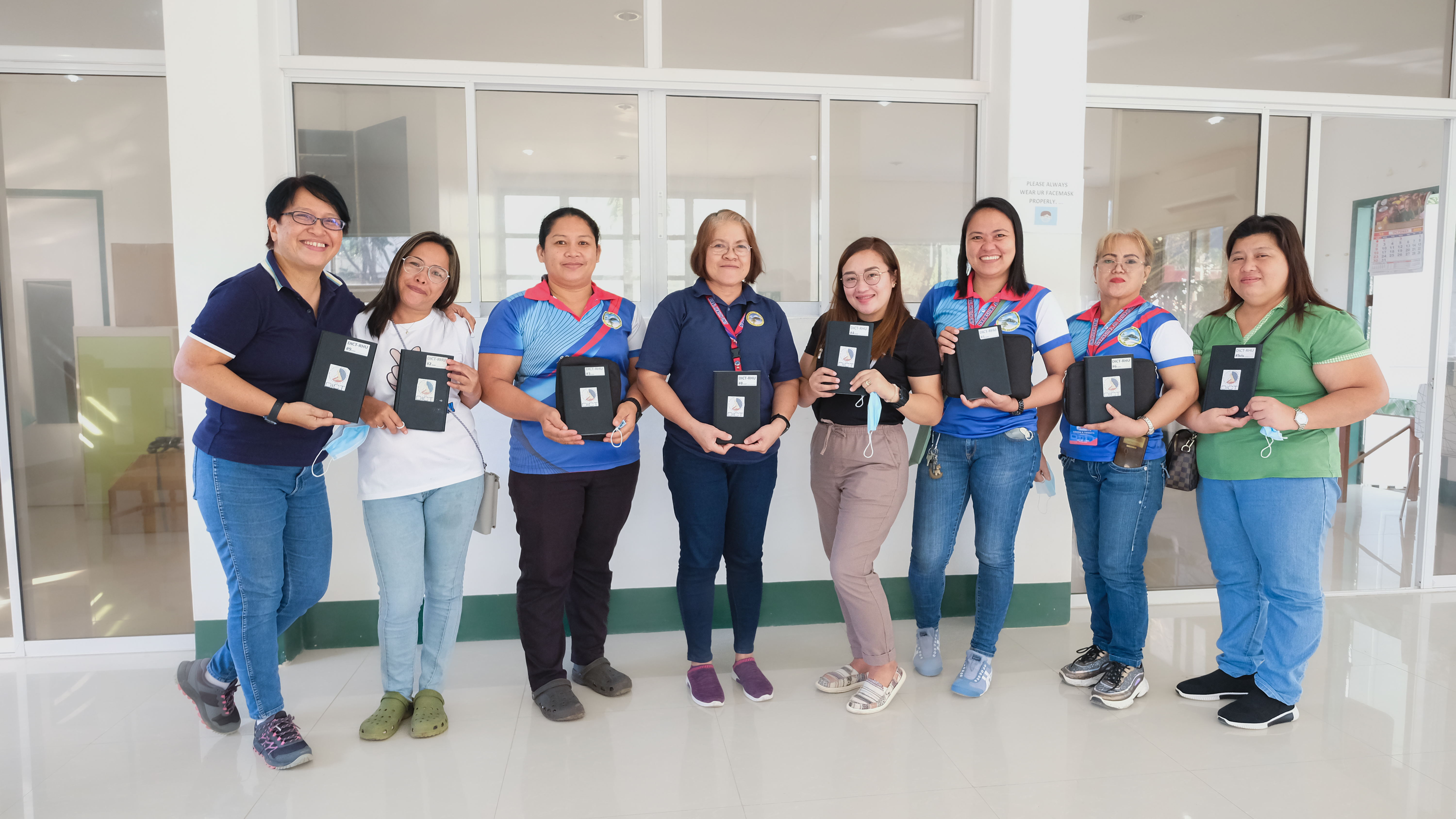Women healthcare practitioners striving to provide better services using technologies
Embracing Innovations for Rural Healthcare
March 8, 2023

Dr. Gay Ardanas (leftmost) with her team of midwives holding the tablets provided to the Talisayan Rural Health Unit
Dr. Gay Ardanas was an anesthesiologist who would frequently volunteer to work in medical missions in remote areas. It’s where she first nurtured her love for public health service. Unfortunately, this was also how she came to realize how poorer communities regularly experience shortage in medical supply and equipment. . Then, she shifted to become a general practitioner and aspired to practice in a local government unit that implements a ‘No Smoking’ policy – an advocacy close to her heart.
“Women are most affected when there’s a smoking spouse. There’s been a lot of studies on this. It causes cancer and hypertension among others, and kids get sick all the time,” she noted.
She eventually found her way to Talisayan in Misamis Oriental, which has been a smoke-free municipality for more than 13 years.
Talisayan is a fourth-class municipality situated along the northwest border of Mindanao, where pristine white and red sand beaches and rich natural forests await anyone who’d come into the locality. With a land area of over 140 km2, Talisayan is home to more than 27,000 Filipinos.
I grew up in a family who has been helping those in need. I realized then that if you’re poor, you don’t have access to basic services such as healthcare. I’ve seen pain and suffering, and I want to help alleviate that. That is why I became a doctor.Dr. Gay Ardanas, Municipal Health Officer, Talisayan Rural Health Unit
Serving as the Municipal Health Officer, Dr. Ardanas led Talisayan’s fight against the COVID-19 pandemic together with her team of midwives from each of the 18 barangay health units. Armed with four office-issued and personal laptops and pen-and-paper, her team would march on to rural barangays to share timely COVID-19 information to their constituents.
“Reporting during the pandemic was hard especially in keeping up with the national tally. We needed to ensure that data is transmitted every single day. It was a challenge in municipalities like ours where there’s no internet connection in most areas and where there is no proper equipment to complement what’s expected of us. We’d have more than 10,000 encoding backlogs then.”
The Department of Information and Communications Technology (DICT) and United Nations Development Programme (UNDP) collaborated for the project, Connectivity, Capability, and Resilience through Free Wi-Fi for All (CoRe FW4A), to augment DICT’s efforts in providing effective and efficient free internet access in public spaces. Part of this effort was the delivery of 4,000 tablets to rural healthcare facilities to support data transmission during the height of COVID-19 vaccination campaign.
Among the recipients of this initiative was Talisayan.
“That is when the local government provided us with ten (10) tablets to be used for data encoding and transmission. The tablets are small and light, and thus very convenient to bring with us in remote barangays. Matched with manpower from the Department of Labor and Employment (DOLE), we eventually caught up with the backlogs and have kept our data up-to-date,” Dr. Ardanas exclaimed.
Dr. Ardanas and the midwives had to immerse themselves with this technology and learn how to navigate it – moving away from the pen-and-paper they have been used to. She quipped, “they had to learn it or leave.”
One of Dr. Ardanas’ midwives demonstrates how they access the iClinicSys using a tablet
As the vaccination campaign slowed down and the community returned to their pre-pandemic situation, the Talisayan RHU found another productive way to use the tablets: they now use them to access the Department of Health’s iClinicSys, a system that health workers can use to record and update their constituents’ health profiles, including mental health conditions, if any. The practice has been to save the records offline when they go to the barangays, and then upload the entries to the online database every Monday.
Other uses of the tablets include teleconsultation with those who have the equipment, and health information promotion such as when discussing family planning in remote barangays.
“Innovations are very important for health centers. The tablets we received are small, but we managed to utilize them for so many applications…how much more with bigger technologies? Innovation such as this make health services more available and accessible to our constituents. We want to be the pilot for health technologies. Our health center welcomes any initiatives and innovations to better serve our community.”
“We are deeply grateful to our benefactors who provided us with the tablets. We hope they can still support us in our vision to have at least one dedicated tablet for each of our programs and towards integrating innovations in our health center.”
The Connectivity, Capability, and Resilience through Free Wi-Fi for All (CoRe FW4A), is a collaborative project between the Department of Information and Communications Technology (DICT) and United Nations Development Programme (UNDP) to augment DICT’s efforts in providing effective and efficient free internet access in public spaces covering higher education institutions, geographically isolated and disadvantaged areas (GIDA), indigenous peoples (IP) communities, health facilities, and disaster vulnerable areas. [END]

 Locations
Locations
